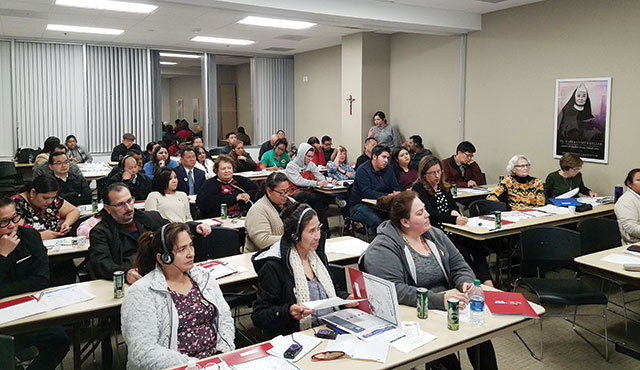“Every person counts.” It makes for a nice motto, or even a t-shirt, but in the case of the U.S. Census and the Diocese of Orange, it is much more than that.
Information gathered from the U.S. Census is used to direct funding to numerous social and economic services provided by the government to places where it most needed.
Places like the ethnically diverse communities that the diocese, parishes and the many charities of Orange County serve. The irony is those neighborhoods most in need of aid are often the most difficult to accurately count.
Density, language barriers and fear of large government intervention, loss of services and deportation add to the challenge of accurately counting the population.
“Nearly all of our parishes have hard-to-count areas within them,” said Greg Walgenbach, director of the Office of Life, Justice and Peace for the Diocese of Orange. “We are training parish leaders to reach out to fellow parishioners and neighbors and get the word out.”
Historically, California has experiences greater undercounts that the rest of the country because of a high share of “hard-to-count people,” including “immigrants, who may be even harder to count in 2020 than they were in the past,” according California Legislative Analyst’s Office.
The government directs more than $2,000 per person in tax revenue to communities, based in part on census numbers. Groups such as Catholic Charities work with and rely on the government funding for a number of their programs that feed and provide housing for the poor.
“It really does affect everyone,” Walgenbach said of the census. “It’s all the more felt where people are not counted accurately.”
Census numbers guide how and where about $800 billion in federal taxes are spent. It pays for schools, roads, hospitals, child care and senior centers. Money also goes to Medicaid, Special Education Grants and to a wide spectrum of social programs for the poor and disadvantaged.
That is why the U.S. Conference of Catholic Bishops issued several statements in 2019 reminding congregants and Church leaders of the importance of the Census, “to effectively serve those in need.”
“We want to make sure none of our neighbors are falling through the cracks,” Walgenbach said.
However, the Legislative Analyst’s Office downplays many fears saying, “even in this worstcase scenario” the cost would be “tens of millions of dollars—not billions of dollars—in federal funding.”
It also admits that it cannot estimate the effect on local governments, or “hard-to-count” communities.
Every 10 years since 1790, the United States government has conducted counts that strive to account for all of the more than 327 million people in the country. All U.S. residents as of April 1, 2020, are legally required to participate.
Policies and efforts by President Donald Trump have added to angst, particularly in the immigrant community, first in his failed push to add a citizenship question to the census and later when the Supreme Court upheld the administration’s revise public charge rule that makes some immigrants ineligible for permanent legal status if they use certain public benefits, such as Medicaid, food stamps and housing vouchers.
According to the New York Times, before the citizenship question was removed, one government estimate was that “about 6.5 million people might not be counted” if the citizenship question had been kept.
Catholic priests, deacons and volunteers in the Diocese of Orange have been working to allay fears and assure residents that their responses are confidential and will not be released to any agency or in any way affect their existing benefits or threaten future citizenship.
According to Father Vincent Tran, director of the Vietnamese Catholic Center in Santa Ana, the message has gotten through to his congregants.
“For Vietnamese, the fear is very low,” he said.
That said, he lists census education as “among many important issues (for Vietnamese).”
Tran said the census will be a recurring theme on the weekly Vietnamese-language, “Loving Our Faith” radio show on AM-1480.
It was a Roman census that brought Joseph and Mary to a manger in Bethlehem where Jesus was born.
According to Luke 2:1-5 in the Revised Standard Version, Catholic Edition: “ … all went to be enrolled, each to his own city. And Joseph also went up from Galilee, from the city of Nazareth, to Judea, to the city of David, which is called Bethlehem, because he was of the house and lineage of David, to be enrolled with Mary, his betrothed, who was with child.”
But for that census, the Catholic Church and Christianity may have been very different.
The Diocese of Orange’s 2020 Census Committee has met with U.S. Census officials and is convening parish leaders to assemble volunteer teams, distribute information and create questionnaire assistance centers at various churches. General information is available online at census.gov
Parishioners are urged to fill out their census questionnaires early, which is the best way to avoid having census workers knocking on their doors.
As Walgenbach said, “We want to see everyone have access to services.”

